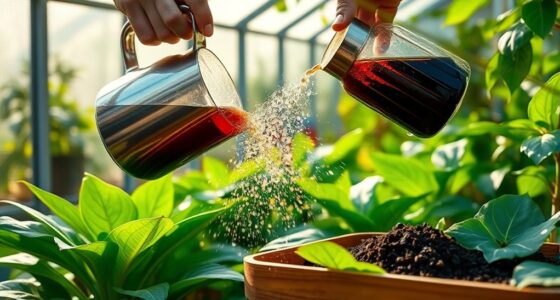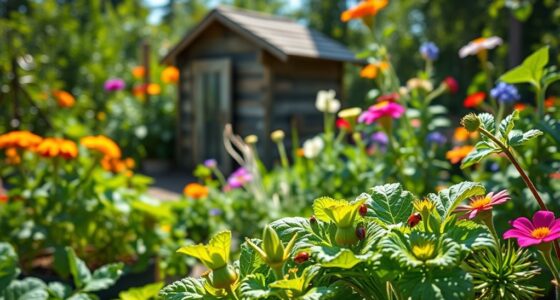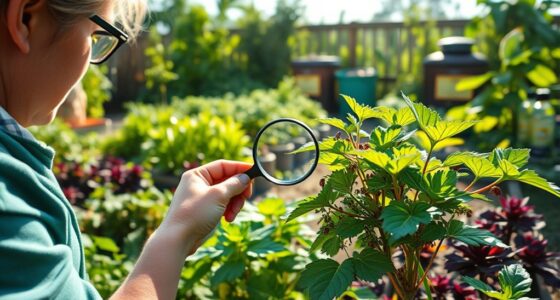To create a simple DIY natural insecticide, mix about 1 tablespoon of mild, biodegradable liquid soap with a quart of water. Shake it well and spray on affected plants, focusing on undersides of leaves where pests hide. Apply during early morning or late evening to avoid leaf burns, and reapply every few days or after rain. If you want to discover more tips on how to keep your garden pest-free naturally, keep exploring this guide.
Key Takeaways
- Mix 1 tablespoon of biodegradable liquid soap with 1 quart of water to create an effective DIY insecticide.
- Spray early morning or late evening to prevent plant sunburn and maximize pest contact.
- Target soft-bodied pests like aphids, spider mites, and whiteflies for best results.
- Reapply every few days or after rain to maintain pest control effectiveness.
- Combine soap sprays with beneficial insects and companion planting for integrated pest management.

If you’re looking for an effective and eco-friendly way to keep pests at bay, making your own natural insecticide is a simple and affordable solution. One of the best methods is using soap sprays, which are safe for your plants, beneficial insects, and the environment. Before you start spraying, consider integrating companion planting into your garden. Companion planting involves growing certain plants together to naturally repel pests or attract beneficial insects. For example, planting marigolds near tomatoes can deter nematodes, while basil can keep aphids away from peppers. This strategy reduces the need for chemical interventions and enhances your garden’s overall health. Additionally, choosing pest resistant varieties of your favorite plants can considerably cut down on pest problems, making your soap spray efforts more effective.
To make your soap spray, you need a mild liquid soap—preferably biodegradable and free of added fragrances or harsh chemicals. Mix about one tablespoon of soap with a quart of water. Shake the mixture well to ensure the soap is evenly distributed. This solution works by suffocating pests or disrupting their cell membranes, which causes them to die or detach from your plants. Spray this mixture directly onto the affected leaves, stems, and undersides where pests hide. The key is to apply it during early morning or late evening hours to avoid sunburn on your plants and to maximize contact time with pests. Detecting passive voice can help improve the clarity and effectiveness of your writing.
Keep in mind that soap sprays are most effective against soft-bodied insects like aphids, spider mites, and whiteflies. They aren’t as effective against larger pests or those with tough exteriors. To bolster your pest control strategy, combine soap sprays with other organic methods, such as introducing beneficial insects like ladybugs or lacewings, which prey on common pests. Regularly monitor your plants, and reapply the soap spray every few days or after rain to maintain its effectiveness. Be cautious not to overdo it, as excessive soap application can harm your plants’ leaves or cause stress.
Frequently Asked Questions
Can Soap Sprays Harm Beneficial Insects in My Garden?
You might wonder if soap spray impact harms beneficial insect safety. Generally, soap sprays are selective and less likely to harm beneficial insects when applied correctly, such as avoiding flowering plants and applying in the early morning or late evening. To protect beneficial insects, you should limit spray contact with pollinators and use a gentle soap formula. Proper application helps balance pest control with maintaining a healthy, beneficial insect population in your garden.
How Often Should I Reapply Soap Spray for Effective Pest Control?
Think of your soap spray like watering plants—too often, and you risk overdoing it. Typically, you should reapply every 5 to 7 days for effective pest control, but weather considerations matter. If it’s rainy or humid, increase application frequency slightly, as soap can wash away or become less effective. Monitoring pest levels helps determine if you need more frequent treatments or if you can stretch out applications.
Are There Specific Soap Types That Work Best for Insecticide?
You might wonder which soap types work best for insect control. Different soap formulations, like pure castile or insecticidal soaps, are most effective. Look for plant-safe ingredients that won’t harm your plants or beneficial insects. Avoid soaps with added fragrances or harsh chemicals. By choosing the right formulation, you guarantee safe, efficient pest control without damaging your garden’s health.
Can Soap Sprays Be Used on Edible Plants Safely?
Did you know that over 70% of gardeners prefer natural pest control methods? You can safely use soap sprays on edible plants if you follow proper soap spray guidelines. Always choose a gentle, plant-safe soap and apply it during cooler parts of the day. Rinse thoroughly if needed, and avoid over-application. This guarantees edible plant safety while effectively managing pests in your garden.
How Do I Store Homemade Soap Spray for Future Use?
To store your homemade soap spray for future use, focus on proper storage methods to preserve its effectiveness. Keep it in a sealed, airtight container away from direct sunlight and extreme temperatures. Typically, the shelf life of homemade soap spray is about one to two weeks, but check for any signs of spoilage before use. Label the container with the date to ensure freshness and safety for your plants.
Conclusion
By giving soap sprays a gentle try, you invite a more harmonious garden where tiny visitors find less appealing. With just a few simple ingredients, you can craft a friendly solution that keeps pests at bay while respecting nature’s delicate balance. Embrace this natural approach, and watch your garden flourish quietly and peacefully. A little effort now can lead to a thriving, vibrant space where both plants and beneficial bugs coexist happily.









